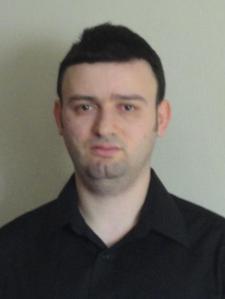Roman C. answered • 06/29/13
Masters of Education Graduate with Mathematics Expertise
Again, the integrating factor comes to use.
t dy/dt + 2y = t2 - t + 1
dy/dt + 2y/t = = t - 1 + 1/t
μ dy/dt + 2μy/t = μ(t - 1 + 1/t)
Let dμ/dt = 2μ/t.
μ dy/dt + y dμ/dt = μ(t - 1 + 1/t)
μy = ∫ μ(t - 1 + 1/t) dt
y = (1/μ) ∫ μ(t - 1 + 1/t) dt
Find μ from it's equation.
dμ/dt = 2μ/t
∫ dμ/μ = ∫ 2dt/t
ln |μ| = 2 ln |t| + C = ln t2 + C
μ = At2
Plug μ in.
y = (1/(At2)) ∫ At2(t - 1 + 1/t) dt
y = (1/t2) ∫ (t3 - t2 + t) dt
y = (t4/4 - t3/3 + t2/2 + C) / t2
y = t2/4 - t/3 + 1/2 + C/t2
Before using the initial value, let's check the general solution.
t * (d/dt)(t2/4 - t/3 + 1/2 + C/t2) + 2(t2/4 - t/3 + 1/2 + C/t2)
= t * (t/2 - 1/3 + 0 - 2C/t3) + 2(t2/4 - t/3 + 1/2 + C/t2)
= t2/2 - t/3 - 2C/t2 + t2/2 - 2t/3 + 1 + 2C/t2
= t2 - t + 1
It checks out.
Now since we have that y = 1/2 at t = 1, plug it in to the general solution to find C.
1/2 = 12/4 - 1/3 + 1/2 + C/12
C = 1/2 - 1/4 + 1/3 - 1/2 = 1/12
So the desired solution is y = t2/4 - t/3 + 1/2 + 1/(12t2).





